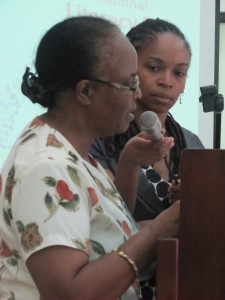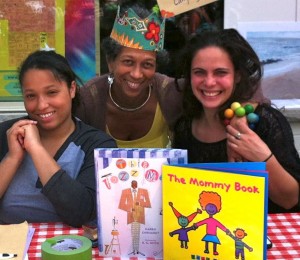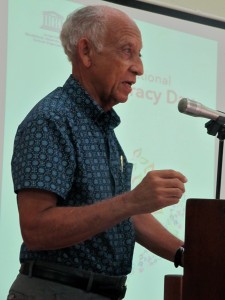
A Way With Words
September 9th, 2014
The Ministry of Foreign Affairs and Foreign Trade played a masterful stroke today – International Literacy Day 2014. Its prosaic, business-like lobby was transformed – by words. Ignoring the hurried Monday lunchtime traffic outside, an audience of literature lovers, writers, government workers and a sprinkling of diplomats sat down and listened with great attention. This year, the theme of the day links literacy to sustainable development – as one of the United Nations’ Sustainable Development Goals that we will all be focusing on from next year.
The Ministry’s recognition of the day was a celebration of the beauty of language. After the formal introductions and remarks by Minister of State Arnoldo Brown (who rightly pointed to gender disparity in education) three Jamaican masters of language took to the podium. The sound through an uncertain microphone was faint at first; but the audience leaned forward in their seats, and the voices grew stronger.

Poet Ann-Margaret Lim holds the microphone for Jean Goulbourne, who read at today’s celebration of International Literacy Day at the Ministry of Foreign Affairs and Foreign Trade. (My photo)
Writer, poet and educators Jean Goulbourne read the rambling meditations of a grandmother in rural Jamaica. She prepares her vegetables, cooks her soup in a big iron pot and feeds her chickens. There is the aroma of escallion and thyme; we can hear the pot bubbling and her voice as she calls the chickens. But the story of Granny Mathilda is not all sweet nostalgia. The woman’s thoughts stray to what has been lost. To her ten children who are not with her, the forty-odd grandchildren and to the new little great-grandchildren. To the four men who disappointed her and left her “tainted,” with no ring on her finger. The words of the hymn “Rock of Ages” weave in and out of the narrative, which flows in the warm country patois of an old woman: “Rock of ages cleft for me. It was a song for everybody.”
Professor Emeritus Edward Baugh’s slightly austere manner is deceptive, hiding a light, dry humor and a tendency to poke fun at himself. He read several poems, his melodious voice rising and falling – including some from his collection “Black Sand,” published late last year. Professor Baugh moved steadily from poem to poem. I particularly enjoyed one about an ice cream van, moving through the high walls of uptown, catering no longer for happy children playing on lawns but for the security guards who work at the gates: “A sweet tooth is no respecter of persons.”
Louise Bennett worked with the literacy movement in Jamaica, Poet Laureate Mervyn Morris reminded us. His new biography, “Miss Lou: Louise Bennett and Jamaican Culture,” was published earlier this year by Ian Randle Publishers. Professor Morris recounted some remarkable occurrences in Miss Lou’s early life and career – including an angry poem she wrote, published in the Sunday Gleaner in 1944, in response to a frivolous lawsuit. He then read three poems, including the darkly hypnotic “The Pond.”
We left deliciously satisfied – but still wanting more. Yes, words are seductive.
So how do you connect this magical world of words with the efforts of our Jamaican children to learn their ABCs? How do you take that huge step from the mechanics of literacy to a true enjoyment of reading? We have to start the children young – it can never be young enough. And another obvious (but oft ignored) maxim: If you want to get young people to really enjoy reading, let them read material they are actually interested in. Allow children to be drawn in, lured by the wonder of language – to explore wherever their interest takes them. There are a number of enjoyable Jamaican books designed for young people that
There is literacy, and there is numeracy. To me, the former is much more alluring. Personally, I have always been fascinated with words, for their own sake. Of course, literacy and numeracy are essential for our development. We must be able to handle words, to work out numbers. These are mechanical skills; words and numbers are tools.
Once mastered and well practiced, literacy will place you in a room with many doors – large and small, some bright, some dark, some lit with lamps. How exciting! You spin around, not knowing which door you should open first. You might want to open them all. If you are not literate, you stand in the same room – but there are no doors. You feel anxiously along the walls, but they are blank. And yet, you know there are doors to be opened, and that when you can – when you do open them, bright light will pour in.
I mentioned above that literacy can never start too early. Well, I know at least two Jamaican women who are proving this every day – putting it into practice, so to speak. Or at least, the children are. Ms. Deika Morrison is enthusiastic about Crayons Count, working with the Early Childhood Commission and other local partners to make learning fun for young children – and to nurture the spirit of reading. Crayons for writing, letter blocks for creating words, and of course books, are important tools on the program; play dough, paint and puppets help children communicate without words. And there’s another Jamaican woman who believes in “growing readers and thinkers from birth” – yes, from birth – “Ms. Pam” Groves. The librarian, owner and founder of Baby Wordplay is based in Philadelphia in the United States and she believes that books, stories and songs help develop literacy skills in infants, even pre-kindergarten.

Jamaican Pamela Groves (center) with two writers and their books at her Baby Wordplay’s Little Theater in Philadelphia, Pennsylvania. (Photo: Baby Wordplay/Facebook)
There is also a stigma surrounding adult literacy that cannot be ignored. I recall not long ago my husband asked a young man who was doing some work for us to write a list of a few items we need to buy. He turned away and hid the paper from us. He could not write. Yet, if adult Jamaicans can overcome this difficulty, and want to learn, a number of non-governmental and faith-based organizations are helping. For example, St. Margaret’s Church in Liguanea, Kingston is registering students for classes right now.
So if you know someone who needs help, whether young or old, reach out. You will be giving them the magical gift of words, and placing them in a room with many doors.
Tags: adult literacy, Ann-Margaret Lim, Baby Wordplay, church, Crayons Count, Edward Baugh, International Literacy Day, Jean Goulbourne, Mervyn Morris, Ministry of Foreign Affairs and Foreign Trade, Poet Laureate, poetry, United Nations
The Gleaner reserves the right not to publish comments that may be deemed libelous, derogatory or indecent.
To respond to The Gleaner please use the feedback form.
2 Responses to “A Way With Words”
- We Are the Zoomers
- Living Online with Humans and Birds: NAOC 2020
- Human Trafficking and the Problem of Public Education
- Down Memory Lane
- Are We Ready to Recover from COVID-19?
- Road Safety Matters: Is Your Vehicle Safe?
- Sexual Harassment, Me Too, and the Minister’s Disturbing Giggle
- The Vulnerable Senior Citizens, Private Care Homes and COVID-19
- A Muddle Over Masks
- Here is Something Life-Saving You Can Do: Give Blood!




Enjoyed reading this piece. Undoubtedly, literacy is essential, it is a sine qua non…
Absolutely! And there are many ways of getting there…